One of opera's most vivid and compelling characters, a vengeful court jester, desperately tries to protect his daughter from disaster in this heart-wrenching tragedy. The first of two world-class casts led by Music Director Nicola Luisotti stars Željko Lučić, "whose vocal artistry is exceptional" (The New York Times); Aleksandra Kurzak, "a superstar in the making" (The Guardian, London); and, as the lecherous Duke, Francesco Demuro, "whose open, bright, superbly focused tone was reminiscent of Pavarotti" (Opera News).
Related Movies

Die Walküre (1990)
The gorgeous and evocative Otto Schenk/Günther Schneider-Siemssen production continues with this second opera in Wagner’s Ring cycle. Hildegard Behrens brings deep empathy to Brünnhilde, the favorite daughter of the god Wotan (James Morris) who nevertheless defies him. Morris’s portrayal of Wotan is deservedly legendary, as is Christa Ludwig, as Fricka. Jessye Norman and Gary Lakes are Sieglinde and Siegmund, and Kurt Moll is the threatening Hunding. James Levine and the Met orchestra provide astonishing color and drama. (Performed April 8, 1989)

Siegfried (1990)
Siegfried is the third of the four operas that constitute Der Ring des Nibelungen (The Ring of the Nibelung), by Richard Wagner.

Amadeus (1984)
Disciplined Italian composer Antonio Salieri becomes consumed by jealousy and resentment towards the hedonistic and remarkably talented young Viennese composer Wolfgang Amadeus Mozart.
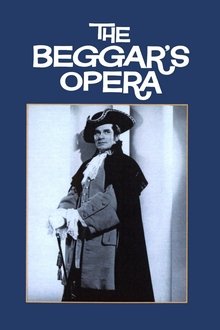
The Beggar's Opera (1953)
Adaptation of John Gay's 18th century opera, featuring Laurence Olivier as MacHeath and Hugh Griffith as the Beggar.
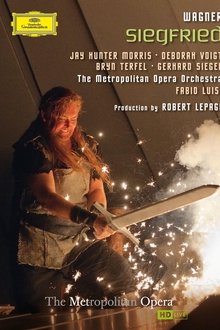
The Metropolitan Opera: Siegfried (2011)
Robert Lepage’s remarkable Met Opera production of Wagner’s Der Ring des Nibelungen, the 2013 Grammy Award Winner for Best Opera Recording, is now available as individual DVDs. Siegfried features Bryn Terfel, Jay Hunter Morris, and Deborah Voigt, with Fabio Luisi conducting.
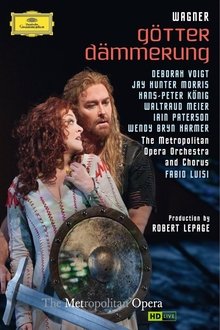
The Metropolitan Opera: Götterdämmerung (2012)
Ring Cycle, pt 4. Siegfried is drugged and tricked into kidnapping his wife, since she has the Ring now. More double-crossings, Siegfried ends up dead. Brunnhilde has had enough of this, tosses the Ring into the river and torches the place.

Elixir of Love (1981)
The incomparable Luciano Pavarotti at his most eloquent brings Donizetti’s Nemorino to live as only he can, combining vocal fireworks, personal charisma, and charm. The enchanting production by Nathaniel Merrill, with designs by Robert O’Hearn, is the perfect setting for Nemorino’s quest to win the heart of beautiful Adina, sung by the sparkling Judith Blegen. Brent Ellis as Belcore and Sesto Bruscantini as Dr. Dulcamara round out the all-star cast. Nicola Rescigno conducts.

Kapr Code (2022)
This film traces the life of Jan Kapr, a prominent Czech composer of the 20th century. A documentary opera with an ambitious libretto and playful and refined editing work, Kapr Code is an unexpected celebration of creativity that shakes up our ideas of biography and pays tribute to the importance of resisting homologation and censorship through art and creation.

The Phantom of the Opera (1925)
The deformed Phantom who haunts the Paris Opera House causes murder and mayhem in an attempt to make the woman he loves a star.
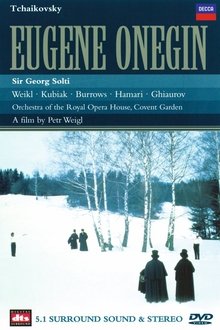
Eugene Onegin (1988)
A filmed version of Tchaikovsky's opera. Onegin visits a friend, his fiancee and her sister Tatiana, who believes Onegin is her fated love. She writes a note telling him so, but he rejects her. Years later he returns, finding her married, but now he's smitten with her.
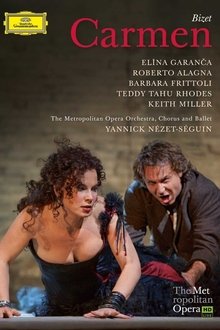
Bizet: Carmen (2010)
Richard Eyre’s stunning new production of Bizet’s opera was the talk of the town when it was unveiled on New Year’s Eve 2009. Elīna Garanča leads the cast as the iconic gypsy of the title—a woman desired by every man but determined to remain true to herself. Roberto Alagna is Don José, the soldier who falls under her spell and sacrifices everything for her love, only to be cast aside when the toreador Escamillo (Teddy Tahu Rhodes) piques Carmen’s interest. With dances created by star choreographer Christopher Wheeldon and conducted by rising maestro Yannick Nézet-Séguin, this Carmen brings every aspect of Bizet’s tale to thrilling life, from its lighthearted beginning to its inevitably tragic climax.

MacBeth (2011)
Macbeth, the Thane of Glamis, receives a prophecy from a trio of witches that one day he will become King of Scotland. Consumed by ambition and spurred to action by his wife, Macbeth murders his king and takes the throne for himself.

Nabucco (1981)
Set during the reign of Nebuchadnezzar (Nabucco), King of Babylon, the opera tells the tale of Nabucco's fictitious daughters, Abigaille and Fenena, who are rivals for the love of Ismaele, nephew of the King of Jerusalem.

Moonstruck (1987)
37-year-old Italian-American widow Loretta Castorini believes she is unlucky in love, and so accepts a marriage proposal from her boyfriend Johnny, even though she doesn't love him. When she meets his estranged younger brother Ronny, an emotional and passionate man, she finds herself drawn to him. She tries to resist, but Ronny, who blames his brother for the loss of his hand, has no scruples about aggressively pursuing her while Johnny is out of the country. As Loretta falls for Ronny, she learns that she's not the only one in her family with a secret romance.

Rossini La cambiale di matrimonio (NaN)
La cambiale di matrimonio, farsa comica in two acts to a libretto by Gaetano Rossi, was first produced at the Teatro San Moisè, Venice, on 3 novembre 1810. The singers at the first performances were Domenico Remolini (Norton), Clementina Lanari (Clarina), Luigi Raffanelli (Tobia Mill), Tommaso Ricci (Edoardo), Rosa Morandi (Fanny), Nicola de Grecis (Slook).

Giordano: Andrea Chernier (2015)
“Kaufmann is performing the title role for the first time, and it’s hard to imagine him bettered. His striking looks make him very much the Romantic and romanticised outsider of Giordano’s vision. His voice, with its dark, liquid tone, soars through the music with refined ease and intensity: all those grand declarations of passion, whether political or erotic, hit home with terrific immediacy.” – The Guardian Presented in its Covent Garden premiere in January 2015, this staging – directed by David McVicar and conducted by the Royal Opera’s Music Director, Sir Antonio Pappano – shows a bloody tricolour daubed with the words “Even Plato banned poets from his Republic” – written by Robespierre on the death warrant of the historical Chénier, a poet and journalist sent to the guillotine in 1794 for criticising France’s post-revolutionary government.

Paisiello Nina (2002)
The opera: Nina, o sia La Pazza Per Amore itself, is an extra-ordinary sad and touching story, and seems very difficult to be performed if the singer has no acting talents. Therefore we adore Cecilia Bartoli for the magnificent performance as the crazy Nina who lost her mind totally. Her magnificent singing, we don't doubt at all, but her acting is amazingly such that it expressed a real situation of a girl becoming crazy and losing her mind caused by painful incidents in her love life. It is also supported by the other singers who are singing matching as perfectly and splendidly as the diva Cecilia Bartoli, especially the baritone Laszlo Polgar with his deep rich voice as the cruel father who has remorse and came back to see his daughter Nina and the young tenor Jonas Kauffmann with his clear light voice, resulting in a surprisingly beautifully performed opera.


